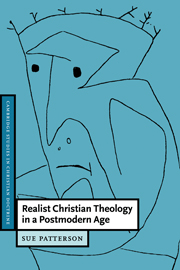Book contents
- Frontmatter
- Contents
- Acknowledgements
- Introduction
- 1 The task of theological realism
- 2 The dilemma of postliberal theology
- 3 Interpreting the truth
- 4 The anatomy of language-riddenness
- 5 The nature of theistic realism
- 6 Becoming persons
- 7 Becoming the Church
- Conclusion
- Select bibliography
- Index of names
- Index of subjects
Conclusion
Published online by Cambridge University Press: 02 December 2009
- Frontmatter
- Contents
- Acknowledgements
- Introduction
- 1 The task of theological realism
- 2 The dilemma of postliberal theology
- 3 Interpreting the truth
- 4 The anatomy of language-riddenness
- 5 The nature of theistic realism
- 6 Becoming persons
- 7 Becoming the Church
- Conclusion
- Select bibliography
- Index of names
- Index of subjects
Summary
In the process of this inquiry three strands or levels of argument have been knitted and cabled together into a sort of theological Aran sweater. Hopefully, the inevitable loss in theoretical elegance accompanying the complex task of trying to think together models and schools that have traditionally been kept separate has been compensated for by a gain in theological comprehensiveness and explanatory force, so that the resulting pattern is at least interesting and useful if not stylish.
The first strand has been the meta-theological one of integrating schools of theology. Here a critical/postcritical realism now expanded and complicated, has come to subsume and incorporate postliberal and revisionist insights. In the process this realism has itself been modified but, it is contended, not critically. The second strand has been the shift from the theoretically non-pragmatical (theological realism and language-riddenness) through the theoretically pragmatical (language games and agency) to the practically pragmatical and then corporately pragmatical (ecclesial practice). The third strand has been the shift from an impersonal and static perspective to the personal and dynamic view of reality already present in theological realism but, for the purposes of this inquiry's incorporation of the weak postmodern thesis, allowed to come progressively into focus.
The contention was put forward in the introduction that if progress is to be made in theology it will not be by digging existing lines of thought deeper, but by developing lateral and synthetic approaches that aim to overcome the shortcomings of realist, liberal-revisionist and postliberal approaches while building on their strengths. In endeavouring to develop these approaches this inquiry began with two premises.
- Type
- Chapter
- Information
- Realist Christian Theology in a Postmodern Age , pp. 161 - 165Publisher: Cambridge University PressPrint publication year: 1999



